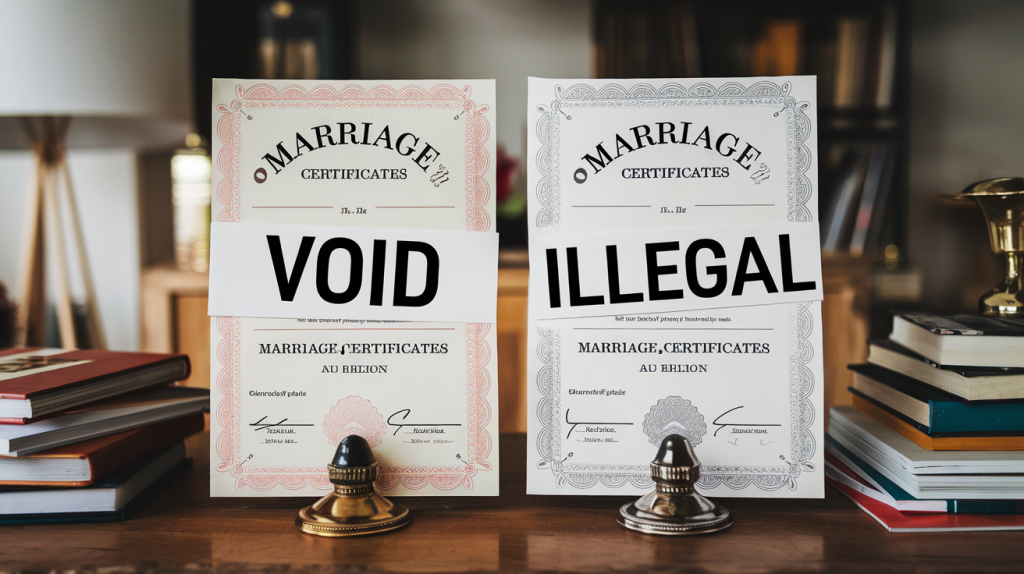Have you ever wondered about the complicated legal web surrounding bigamy in the Sunshine State?
Florida takes a pretty clear posture on this complex issue. Imagine thinking you can legally marry multiple partners – spoiler alert: you can’t.
Bigamy isn’t just a moral taboo here; it’s a serious legal offense that can land you in some trouble.
This blog explains Florida’s marriage laws, focusing on what happens when someone tries to remarry without legally ending a previous marriage.
Get ready for a clear and direct exploration of the legal consequences in Florida.
What Exactly is Bigamy

Bigamy is a legal term describing the act of marrying someone while still legally married to another person.
In Florida, this isn’t just a complicated romantic situation – it’s a criminal offense.
Legally speaking, a person commits bigamy when they enter into a second marriage without first terminating lawfully their existing marriage through divorce, death of a spouse, or annulment.
Difference Between Bigamy and Polygamy
| Detail | Bigamy | Polygamy |
|---|---|---|
| Definition | Marrying a second person while still legally married to a first spouse. | A cultural or religious practice of having multiple spouses. |
| Legal Status | Criminal offenses can result in felony charges. | It is illegal in the U.S. but doesn’t automatically trigger criminal prosecution. |
| Consent and Intention | It often involves deception or legal oversight. | It may involve mutual agreement within specific cultural or religious communities. |
| Social Implications | Severe legal and social stigma. | Varies by culture may have different social acceptance in certain communities. |
| Florida’s Stance | Serious legal violation with potential criminal charges, fines, and imprisonment. | It is not legally recognized but may not trigger direct criminal charges. |
What the Law Says About Bigamy
Under Florida Statute 798.01, bigamy is classified as a third-degree felony. This means engaging in a second marriage while still legally married to another person is a serious criminal offense.
- Criminal Charges: A person convicted of bigamy can face up to 5 years in prison and/or a fine of up to $5,000. The punishment reflects the state’s commitment to protecting the integrity of marriage contracts. The penalties may increase if the individual has a criminal history or if there are aggravating circumstances.
- Void Marriage: The second marriage becomes automatically null and void. This means any attempt to create a new legal union while a previous marriage exists is legally invalid from the start.
- Intentionality Matters: The law considers both intentional bigamy and situations where someone knowingly enters a marriage with an already married person as punishable offenses.
- Defenses are Limited: Common defenses like claiming ignorance rarely hold up in court. If a person knows their previous marriage hasn’t been legally terminated, they can be prosecuted.
- Property and Inheritance: Bigamous marriages can create complex legal complications regarding property rights, inheritance, and other marital benefits.
- Reporting and Prosecution: Law enforcement and court systems take these cases seriously, with potential criminal charges that can significantly impact personal and professional life.
Common Defenses Against Bigamy Charges in Florida

In Florida, individuals charged with bigamy may raise certain defenses to challenge the allegations. These defenses typically focus on a lack of intent or legal misunderstandings regarding the status of the previous marriage.
- Lack of Knowledge: Proving genuine unawareness about an existing marriage can be a potential defense. This might occur if someone was deliberately misled about their spouse’s marital status or believed a previous marriage was legally dissolved.
- Invalid First Marriage: Demonstrating that the first marriage was legally invalid from the beginning could potentially invalidate bigamy charges. This could involve proving issues like lack of proper marriage licensing, fraud in the original marriage ceremony, and undisclosed impediments to the first marriage.
- Presumption of Death: If a spouse was missing for an extended period and legally declared dead, entering a new marriage might be considered valid. However, this defense requires substantial legal documentation.
- Geographical Misunderstandings: In rare cases, marriages performed in different jurisdictions with varying marriage laws might create complex legal scenarios.
- Procedural Challenges: Challenging the technical aspects of how the bigamy charge was filed or investigated can sometimes provide legal relief.
- Incomplete Divorce Proceedings: Proving that divorce was in process but not yet finalized might mitigate some legal consequences.
- Coercion or Duress: Extremely rare, but demonstrating that the second marriage occurred under significant personal threat could potentially impact legal proceedings.
Are There Exceptions to the Bigamy Laws in Florida
Florida’s bigamy laws are pretty strict, with very few exceptions.
- No Legal Exceptions: Florida has zero tolerance for multiple simultaneous marriages. Unlike some cultural practices, the state does not recognize legal exceptions to its bigamy statutes.
- Divorce Pendency: Even if divorce proceedings are underway, a person cannot legally marry another until the first marriage is officially dissolved. A pending divorce is not considered an exception.
- Presumed Death Scenario: The closest to an “exception” is when a spouse has been legally declared dead. If someone remarries after obtaining a court-issued death certificate for a missing spouse, and the original spouse later returns, complex legal proceedings would ensue.
- Religious or Cultural Practices: Personal beliefs or cultural traditions do not override state marriage laws. What might be acceptable in some cultural contexts is still illegal under Florida statute.
- Inadvertent Marriages: Accidental or unknowing participation in a bigamous marriage does not automatically exempt someone from potential legal consequences.
- Annulment Considerations: If the first marriage is proven invalid from the start, it might prevent bigamy charges, but this requires substantial legal proof.
Florida takes marriage laws seriously, and there are virtually no straightforward exceptions to its bigamy regulations.
Are Bigamy Cases Prosecuted in Florida
While not extremely common, bigamy cases do get prosecuted in Florida. Law enforcement and prosecutors take these cases seriously, especially those involving intentional deception or fraud.
- Reporting Mechanisms: Cases often come to light through suspicious family members or friends, accidental discoveries during legal proceedings, administrative records checks, and complaints filed with local authorities.
- Legal Priorities: Prosecutors typically focus on cases that involve intentional marriage fraud, financial exploitation, emotional manipulation of unsuspecting partners, and cases with clear evidence of deliberate misconduct
- Challenges in Prosecution: Some obstacles include difficulty proving intentional deception, complex personal relationship histories, and Limited resources for investigating every potential case.
- Typical Scenarios Leading to Prosecution: Attempting to collect multiple marriage benefits, Insurance fraud, Inheritance complications, and Intentional attempts to circumvent divorce proceedings.
- Consequences Beyond Criminal Charges: Civil lawsuits, damage to personal and professional reputation, potential loss of future marriage rights, and financial penalties.
- Modern Detection: Improved record-keeping and digital databases make uncovering multiple marriage attempts easier, increasing the likelihood of prosecution.
What Happens to Property Rights in Bigamy Case in Florida

Bigamy creates massive property rights complications, potentially leaving all parties financially vulnerable.
- Void Marriage Implications: In a bigamous marriage, the second marriage is automatically considered legally void. This means property rights typically associated with a valid marriage are automatically nullified.
- Marital Property Distribution: Assets acquired during the second marriage may not be legally recognized, property division becomes extremely complicated, and courts prioritize protecting the rights of the first legal spouse.
- Potential Property Outcomes: Assets accumulated during the second marriage might be redistributed. The first legal spouse could claim rights to property acquired during the bigamous period, and Courts may treat property as jointly owned by the first spouse.
- Inheritance Complications: The second spouse typically loses inheritance rights. Children from the second marriage might face legal challenges in property inheritance, and probate courts will prioritize the first legal marriage’s inheritance claims.
- Financial Consequences: Potential forfeiture of jointly acquired assets, loss of potential spousal support or alimony, legal fees associated with property disputes, and Potential financial penalties for fraudulent marriage attempts
- Legal Protections: Courts aim to prevent financial exploitation, innocent parties in bigamous marriages receive some legal safeguards, and complex legal proceedings determine final property distributions.
Conclusion
The legal complexities surrounding multiple marriages are no joke. While love might seem complicated, Florida’s laws are crystal clear: one marriage at a time.
Understanding these regulations isn’t just about avoiding criminal charges—it’s about protecting yourself, your relationships, and your future.
Bigamy isn’t just a legal technicality; it’s a serious issue with real-world consequences.
So, take a moment, do your homework, and make informed choices. Your future self will thank you for staying on the right side of the law.
Frequently Asked Questions
Is it Hard to Prove Bigamy?
Proving bigamy can be difficult, requiring evidence of an existing marriage while entering another without legal dissolution. Marriage records and testimony are often key in such cases.
How Do You Charge Someone with Bigamy?
Bigamy charges are typically filed when it’s proven that someone knowingly married another person while still legally married. The offense is reported to law enforcement or during legal proceedings.
How Many Times You Can Legally Get Married in Florida?
In Florida, there’s no specific limit to the number of times you can marry as long as each marriage is legally dissolved before entering another. However, bigamy is illegal.








